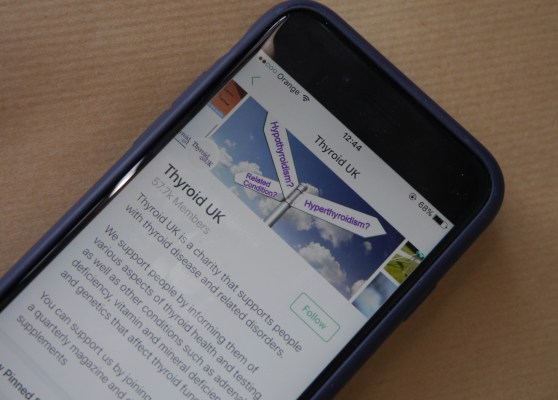Long time UK-based health-focused social network HealthUnlocked has flipped the switch to make its mobile app globally available, aiming to boost access to its network and feed more data into machine learning matching algorithms it began applying to the platform earlier this year — idea being to help people with the same health condition find each other so they can share information and support.
“The new app makes the HealthUnlocked network more accessible than ever before and we expect more people to use the platform as a result, meaning more data is collected and users receive highly tailored recommendations,” is its concise take on broadening the app’s reach.
While it launched the app back in February, HealthUnlocked’s website launched in 2012 and now has more than 700,000 registered users and around 40 million visitors annually to ~700 online support groups. The majority of group offer support for people with long term conditions, but the platform also offers general wellness communities, with groups focused on topics such as healthy eating and fitness.
Users can join multiple online communities, posting to share and interact publicly with other members. They can also individually message others, says if they want to privately discuss a shared health condition.
There’s no requirement to use real identities within the app — indeed, users are encouraged not to do so, given the sensitive nature of discussions. While support groups are moderated by relevant not-for-profit organizations which can also feed information into the communities. HealthUnlocked says it has more than 700 charity and non-profit partners at this point.
“The app has been developed around the platform and its large user base,” it says. “Every time a user writes something within the platform, we now run 638 algorithms, allowing us to understand the subject and health context of what has been written. For example, if you write about ‘weight loss’ understanding the the context it was written in — for example anorexia, rather than a new cancer drug or the start or a user’s running regime — makes a huge difference when you are making inferences about what the user is interested in.”
The information it needs to request at onboarding is “less than ever before” — on account of leaning on machine learning algorithms to extract custom insights from users’ interactions.
“Initial onboarding collects gender, health interests and diagnosed conditions to initially recommend online communities. We then use our technology and algorithms to create a health profile by understanding their behavior, the pages they read, or conditions they write about. They are then recommended further communities to join and other useful connections. This is a constantly evolving process based on the individual’s activity,” it adds.
The UK company has raised £5M to date from private investors from the tech and health sectors in the UK and Silicon Valley, including Nick McKeown (Nicira, Barefoot) and Professor Walter Nimmo CBE (Inveresk).
It monetizes via matching users to relevant content, products and services, based on what it learns about them as they use the network. It says a big part of its commercial activity involves matching people to clinical trials and market research opportunities.
While another strand of its business is licensing a care planning tool it built for cancer patients, which is run in partnership with Macmillan Cancer Support. This is being used in more than 100 hospitals across the UK at this point, and is due to be rolled out to all hospitals in England later this year.
